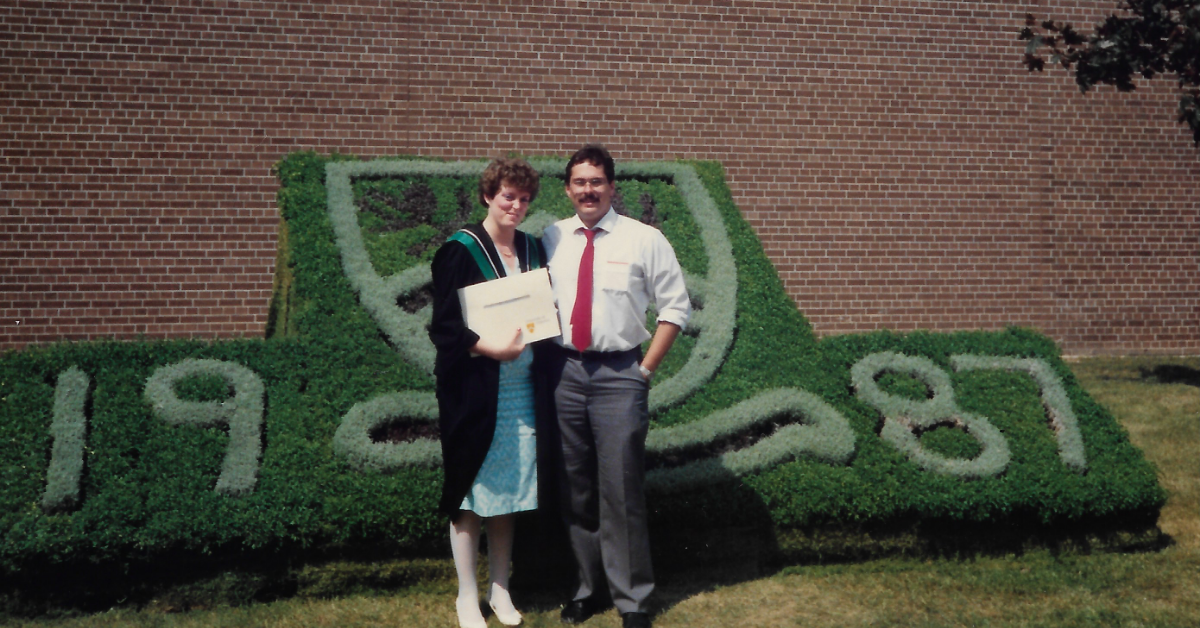I have been in the workforce on and off, in a number of different capacities since I was a 14-year-old “Page” at the Kitchener Public Library. I have worked in fast food and direct sales, for non-profits and small, medium and large organizations. I have worked in different sized cities and towns throughout Ontario and out west in Calgary. I have held positions I loved and some I really didn’t.
I am a self-starter who learned my work ethic from 2 parents who never took a day off work. I truly remember my dad taking only 1 sick day when I was growing up; he and all 4 of us kids had the flu so he stayed home and my mom went to work. I thrive when given new challenges, doing work that is meaningful to me, and opportunities to learn. I know this is what motivates me and I have always been fascinated by the things that motivate others.
University of Waterloo

In university, I took a double major in Psychology and Applied Studies (this involved courses from a number of disciplines). I quickly discovered that Industrial and Organizational Psychology was the specialization that held the most interest for me. It is the study of human resources and how to apply psychological theories and principles to improve the performance, motivation and job satisfaction of employees. I was so interested in the topic that I added a minor in Personnel and Administrative Studies.
I was lucky to be in a co-op program at university where I got to have 3 work terms in Human Resources at Petro-Canada in Calgary. These experiences were really great learning opportunities and solidified for me that Human Resources was where I wanted to spend my career.
Satisfiers and Dissatisfiers
Most organizations, regardless of what they actually do, spend the majority of their budget on salaries and benefits. It just makes sense to me that the goal should, therefore, be to create policies and practices that maximize the motivation and satisfaction of their employees.
I remember an “aha moment” in class when we discussed Frederick Herzberg’s research on job satisfiers and job dissatisfiers. (I know university was a long time ago, but I think his research is still relevant!) While it seems obvious that a higher salary, better benefits and good working conditions will make employees happier, Herzberg found that these things are external to the position and will only make people happy in the short term. For example, a raise or bonus makes employees happy, but only for a short period of time and then they are looking for the next increase.
Job satisfiers are things like achievement, responsibility, advancement and meaningful work; they come from inside, rather than being imposed by others.
I thought then, and still believe, that this information has the potential to revolutionize workplaces. When I look at the different places I have worked and the different positions I have held, I think there are some really basic ways to improve employee relations that would definitely come out on top of a cost-benefit analysis.
- Do employees understand what they are doing and the impact of their work on the mission/product/profitability of the organization?
- Does anyone ever question why certain policies exist? Is it because they have always been there or is there a valid reason for them? Has anyone done a cost-benefit analysis on the policy, particularly when it comes to dissatisfiers like wages, benefits and vacation?
- Are there any decisions that can be downloaded to employees? If COVID has taught us anything, it’s that there is a lot of work that can be done from home; is there any way employees could be given some choices about where or when they work?
Unfortunately, over the years I found human resources to be more about labour laws and collective agreements, and less about the big picture, revolutionary things I was hoping to see. So I moved into parent education where I have found with Muskoka Family Focus a position that maximize the job satisfiers for me!





Karen Royce
Great article! I continue to learn from you. Thank you.
Carol
Thank you! xo
Michelle
Interesting journey Carol.
Interesting scope if work
Carol
Thanks Michelle!